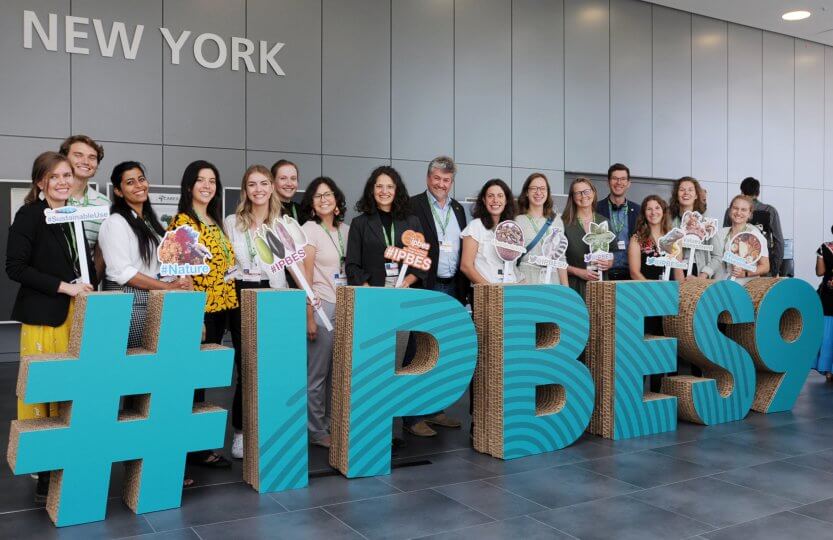This year, Global Change Ecology students had the opportunity to join representatives from 139 member states, high-profile stakeholders and NGOs in attending the ninth session of the Plenary of the Intergovernmental Science-Policy Platform on Biodiversity and Ecosystem Services (IPBES 9). Every year, this intergovernmental panel convenes to address the state of biodiversity and ecosystem services on a global scale.
Similar to how the IPCC represents key scientific consensus on climate change, IPBES produces important findings for decision making and stakeholders in the field of biodiversity. In 2019, the plenary yielded a global assessment on biodiversity and ecosystem services that sounded the alarm on a global crisis of biodiversity loss. According to the report, one million plant and animal species across the world are at risk of extinction. Although these numbers are sobering, this knowledge is essential for conservation policy and science. This year, the platform planned to approve two new reports highlighting the diverse uses and values of wildlife to humans and non-humans.
IPBES 9 took place both virtually and in Bonn, Germany from July 3-9, 2022. Students from the master program Global Change Ecology (GCE) could attend either as observers of the conference or as volunteers with the IPBES secretariat. In both cases, they were able to attend sessions, meet science and policy experts, and see firsthand the process of international negotiations. GCE sent more than 20 student volunteers to help run the event. This included tasks such as registration, running the help desk, managing the IPBES social media channels, working in the back office, and managing representatives in the session.
Personal Reflections from a Back Office Volunteer
When I first signed up to volunteer at IPBES 9, I was not sure what to expect. In all honesty, I had never actually heard of IPBES before. Nevertheless, I was interested in learning more about the organization and gaining experience through volunteering.
I chose to volunteer in the back office because I have technical skills that could come in handy. I had volunteered at some conferences in the past, so I figured that the experience would be somewhat similar. However, upon arriving at the venue, I realized that this experience would be different in some key ways.

For one, the stakes were much higher. As a matter of international diplomacy, attendees were not representing themselves, but their governments. Additionally, while IPBES is not a UN body, the United Nations Environment Program provides the secretariat for the plenary. As a result, student volunteers got to volunteer and interact with UN employees. The international and intergovernmental nature of this event made it feel very “serious” and, as student volunteers, we appreciated the importance of our work.
When it came to my work specifically, I was very satisfied with my experience volunteering in the back office. I assisted the technical team with essential tasks such as:
- Sending push notifications to attendees through the conference app
- Updating the session schedule as times changed
- Posting media releases to the website
- Managing and monitoring online participants
- Troubleshooting technical issues
As an outside observer of IPBES 9, it would be easy to overlook the people working “behind the scenes”. As a volunteer, however, it is clear that there is a lot more that goes into these negotiations than meets the eye. While the experts, policy makers, diplomats and stakeholders are the focus of the negotiations, it is the IPBES secretariat and conference technicians that ensure the meeting goes smoothly.
Working on the technical side of the conference meant doing a lot of “little things” such as hitting “record” on zoom sessions, checking equipment, responding to emails, editing powerpoints, etc. Many of these tasks needed to be completed simultaneously or in a limited time period. While the work was fast-paced, I definitely feel like I learned a lot about managing my time, prioritizing tasks, and problem solving. Additionally, I always worked on a team and with a supervisor who could assist if need be.
Due to the nature of the work, I listened closely to the discussions and followed along for the duration of the (lengthy) sessions. As a result, I was able to pay attention to the details and nuances of the diplomatic process. It was surprising to see how finely the member states dissected the language and terminology of the reports. Of course, the point of the plenary is precisely this, to involve various governments in the communication of science and policy. This meant that every member state had to agree on every single word of the documents approved.
The tedious reviewing process took place every day, all day. When the reports were finally approved, it was hard not to get swept up in the emotion of it all. It was particularly exciting for the experts who had been working on these documents for four years to finally see their work come to fruition. Even as a volunteer who had just recently learned about the mission of IPBES, I was ecstatic that I could see this process happen. In a way, it felt as if I were along for the ride, especially after seeing all of the hard work that the volunteers, secretariat and technicians had put into facilitating it. The final days were marked by overwhelming excitement (and exhaustion) after a very busy and intense week. Now we waited for the outside world to get the reports.
Results of IPBES 9
The result of IPBES 9 was the publishing of two landmark reports, the “Assessment report on the sustainable use of wild species” and the “Methodological assessment regarding the diverse conceptualization of multiple values of nature and its benefits”. With thousands of references and dozens of contributing authors, these reports present important scientific and policy consensus.
According to the sustainable use assessment, 1 in 5 people around the world rely on some 50,000 wild species for purposes such as food, fuel, medicine etc. For the world’s poor, this dependence is even greater. The findings from this assessment highlight the importance of wild species for humans.
The values assessment points out that the predominant short-sighted view of nature is the main driver of biodiversity loss. Instead of viewing nature as merely a commodity to exploit, the assessment highlights more than 50 alternative methods and approaches to value nature. This includes indigenous perspectives and women’s involvement in stewardship decisions.
When considered together, the findings highlight the importance of changing our relationship to nature and protecting biodiversity. Especially in order to protect vulnerable people all over the world in the face of climate change, conflict, the pandemic, and inflation. As a student who studies in the field of ecology, biodiversity, and global change, it was a truly educational experience to learn about these two reports. Not to mention the skills, experiences, and networking I did along the way.
Zachary is a GCE student coming from the United States. In 2020 he graduated from the University of Florida with a Bachelor of Arts in Sustainability Studies. He is interested in pursuing a career in science communication after graduation.











thanks for sharing such a nice information